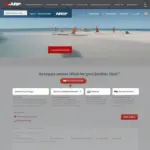Have you ever dreamt of turning your passion for travel into a thriving business? Imagine crafting unforgettable journeys for others, exploring exotic destinations, and making a living while doing what you love. Starting a travel business can be an exciting and rewarding adventure. Whether you envision yourself as a travel agent specializing in eco-tourism adventures in Costa Rica or a tour operator curating culinary experiences in the heart of Tuscany, this guide will equip you with the knowledge and inspiration to turn your travel dreams into a reality.
1. Define Your Niche and Target Audience
The travel industry is vast and diverse. To stand out, you need to carve out your niche. Are you passionate about sustainable travel, luxury honeymoons, budget backpacking, or family adventures? Defining your specialty will allow you to focus your marketing efforts and attract the right clients. For instance, if you excel at planning trips for multigenerational families, you might target your services towards family reunions or milestone celebrations.
Understanding Your Ideal Client
- Demographics: Age, income, family status, location.
- Travel Preferences: Adventure, luxury, budget, relaxation.
- Interests: Culture, history, food, nature, wellness.
By understanding your ideal client, you can tailor your services and marketing messages to resonate with their needs and aspirations.
 Travel business planning meeting
Travel business planning meeting
2. Craft a Solid Business Plan
A well-structured business plan is your roadmap to success. It outlines your business goals, target market, competitive landscape, marketing strategy, and financial projections.
Key Elements of a Travel Business Plan:
- Executive Summary: A concise overview of your business.
- Company Description: Your mission, values, and unique selling proposition.
- Market Analysis: Research on your target market and competitors.
- Products and Services: Detailed descriptions of your offerings.
- Marketing and Sales Strategy: How you’ll reach and acquire clients.
- Financial Projections: Revenue forecasts, expenses, and profitability.
3. Choose a Business Structure and Register Your Business
Selecting the right legal structure for your travel business is crucial for tax and liability purposes.
Common Business Structures:
- Sole Proprietorship: Simple to set up, but offers no legal separation between you and your business.
- Partnership: Two or more individuals share ownership and responsibilities.
- Limited Liability Company (LLC): Offers personal liability protection and tax advantages.
- Corporation: More complex, but provides the most robust legal protection.
Consult with a legal professional to determine the best structure for your specific situation.
 Travel website on a laptop screen
Travel website on a laptop screen
4. Obtain Necessary Licenses and Permits
The travel industry often requires specific licenses and permits to operate legally. Contact your local and state authorities to inquire about the requirements in your area.
5. Secure Funding (If Required)
Starting a travel business may require upfront investments in technology, marketing, and other operational expenses. Consider your funding options:
- Personal Savings: Bootstrapping can give you complete control but may limit your growth potential.
- Loans: Traditional bank loans or Small Business Administration (SBA) loans can provide the necessary capital.
- Investors: Angel investors or venture capitalists may be interested in supporting your business in exchange for equity.
6. Build Your Online Presence
In today’s digital landscape, a strong online presence is paramount. Create a professional website that showcases your services, destinations, and client testimonials. Utilize social media platforms like Instagram, Facebook, and Pinterest to engage with potential travelers, share captivating travel content, and build a loyal following.
Pro Tip: Consider offering a free travel planning guide or checklist as a lead magnet to capture email subscribers and nurture relationships with potential clients.

